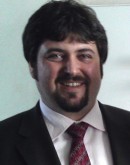
Plenary Lecture
Interactive Simulation in the Field of Human–Machine Interaction in Transport Systems: Tools and Methods for Research, Training and Education

Associate Professor Petr Bouchner
Head of Department of Vehicles at Faculty of Transportation Sciences
Driving Simulation Research Group
Czech Technical University in Prague
Czech Republic
E-mail: bouchner@lss.fd.cvut.cz
Abstract: Problems of reliability and safety of interaction between the human operator (driver) and him/her controlled artificial system (machine, vehicle) are the crucial research tasks within the scope of safety in transport. Most of the accidents happened due to the failure of a human factor. It can either happen when controlling (driving) the machine (vehicle) but also when maintaining it or even sooner when it is manufactured or designed. A failure is often caused either by a bad design of the system or an insufficient or unsuitable training of the human operators. Since the only communication between the operator and artificial systems is realized via the interfaces, just the field of interfaces is the topic of our contemporary research performed in our laboratories.
The lecture introduces problems of the Human-Machine Interaction (HMI) research field as well as problems of user interfaces in systemic point of view. These will be discussed in general, seamlessly moving towards the field of driver- vehicle interaction reliability and safety. The objective approaches and measures to investigate in the reliability of operator-machine interaction are discussed as well as mathematical modeling tools. Beside those general approaches, the lecture introduces in more detail our main research focus - ergonomics and human factors in vehicle control.
The presentation shows and explains main principles of the research tools – the advanced interactive ground vehicle simulators, which are continuously being developed by the Driving Simulation Research Group at Czech Tech Univ. It encompasses passenger cars, two-wheelers, trucks and/or rail engines. This field of R&D deals with simulation technology but also scenario and experiment design and mainly measurement tools and methods, which are fitted for particular experiment types. Indisputable role in this area is played by measuring devices, especially those which work with so called psychophysiological measures. The data measured during the experiments are usually hard to be interpreted in a straightforward way, mainly those which have biological nature - therefore also some advanced analytical and classification tools are discussed.
At the end of the presentation most recent and/or most valuable results and conclusions, which presents outputs of almost 15 years research effort in this area, will be shown. The lecture is accompanied with vivid videos.
Brief Biography of the Speaker: Academic career: 2003 - Master Degree at CTU Prague (Faculty of Electro-engineering), specialization in computer engineering, 2007 - Doctoral Degree at CTU Prague (Faculty of Transportation Sciences) “Driving simulators for HIM research”, 2011 degree of associate prof. (doc.) at CTU Prague. Since 2003 researcher and university teacher, since 2007 Head of Driving Simulation Research Group, since 2008 deputy head of Laboratory of Systems Reliability of FTS,CTU and Institute of Informatics of Academy of Sciences of Czech Republic, since 2011 head of Department of Transporting Technologies.
Scientific activities: research activities in interactive and driving simulator construction and development, HMI in vehicles, human factors in transportation, measurements and analysis of complex data, implementation of virtual reality tools into the experiments, design of experiments and their analysis, member of editorial board of scientific journal Neural Network World.
Since 2003 wrote several tens of papers, chapters in journals, book chapters, research report with topics on interactive simulators, human factors in transportation, ergonomics, driver’s attention and fatigue, worked in expert groups of PIARC and European Committee. Main solver of several national scientific and applied research projects (grants).